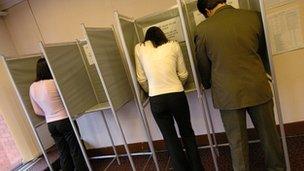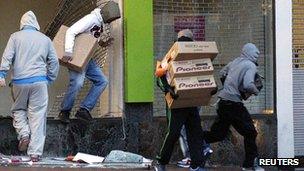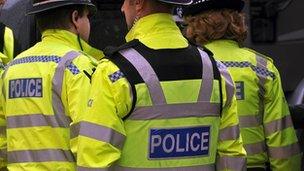New police bosses to be elected on 'Super Thursday'
- Published
- comments

'Super Thursday' will be a day like no other in British political history
It's a week of headlines about 'Super Tuesday' in the US Presidential race. But we 'over here' are not to be outdone.
Thursday, 15 November 2012 to be precise... If elections are your thing, you will be in for a treat.
And our own 'Super Thursday' does undoubtedly chime with the more presidential, American style of politics; it will be a day like no other in British political history.
For a start, there would be polling for directly-elected mayors if cities like Birmingham and Coventry vote for the idea in May's referendum - see my recent blog post.
But also on that date, right across England, for the first time there will be elections for a total of 41 Police and Crime Commissioners, one for every force area.
Police powers
It's all part of the government's vision of localism, and there's more than an echo of that debate about elected mayors, whenever ministers talk about the new-style commissioners.
They tell us it's all about raising the "visibility and accountability" of the people answerable to local electorates for fighting crime.
During the summer riots in Birmingham and the Black Country, the Home Secretary Theresa May compared what she called the "invisible" West Midlands Police Authority with the high profile role of London's elected mayor, Boris Johnson.

The riots reinforced ministers' determination to press ahead with replacing the police authorities with the new style directly-elected leaders
Accompanied by the world's media, he joined the clear-up operation, broom in hand.
The Chairman of the West Midlands Police Authority, external, Bishop Derek Webley, said he felt personally insulted by Mrs May and wrote to the Home Office, external demanding an apology.
But the events of our troubled late summer merely reinforced ministers' determination to press ahead with replacing the police authorities with the new style directly-elected leaders.
They will not take over from the existing chief constables, but they will have the power to hire and fire them.
They will also manage the force's budgets and set policing priorities.
And in the largest force areas like the West Midlands, they will command six figure salaries.
'Recipe for disaster'?
It would be surprising if police chiefs had gone out of their way to welcome the idea.
Speaking with the freedom of a former Chief Constable, Geoffrey (now Lord) Dear, the former head of the West Midlands force who now sits as a cross-bench peer, says ex-policeman would not make ideal commissioners because they would be unable to stop themselves interfering in day-to-day operations.
A convinced critic of the idea is the police blogger Inspector Gadget, external.
"One would assume", he writes, "that whoever gets elected wants to get elected again, and the way to get elected again is to show that you are dealing with crime better than the next guy, and the way to do that is to give the police targets and make them stick to them."
But one minister told me recently there was no suggestion that commissioners would mean yet more target-setting.
He said the politics authorities had failed both to hold the police to account and to ensure the public's priorities were met.
During a recent debate at the University of Birmingham on the question of directly-elected mayors, the former Deputy Prime Minister Lord Heseltine, external said the new breed of city and police bosses were important features of what he called "a quiet revolution".
In his view powers which had been gradually transferred to the clutches of central government over many decades were now being restored to local decision makers.
Voter perspectives
But do local people really want more of a say over their police service?
One recent opinion poll indicated a tentative 'yes'.

Lord Heseltine says a 'quiet revolution' is taking place with plans for elected police commissioners
A recent online survey by Comres, external of nearly 2,000 people for the Local Government Association, external, suggested that although general awareness of the forthcoming elections remained low, two thirds of those questioned would turn out and vote.
This will be our big talking point in the Midlands section of the Sunday Politics this weekend.
With me in the studio will be two MPs who were both lawyers before entering Parliament.
It's 28 years since Bill Cash, external, the Conservative MP for Stone in Staffordshire did so; while the Shadow Business Minister, Shabana Mahmood, external, was elected Labour MP for Birmingham Ladywood less than two years ago.
And I hope you will join me too, at the earlier time of 11.00 on BBC One on Sunday, 11 March 2012.
And remember you can also follow me on Twitter: PatrickBurnsBBC , external